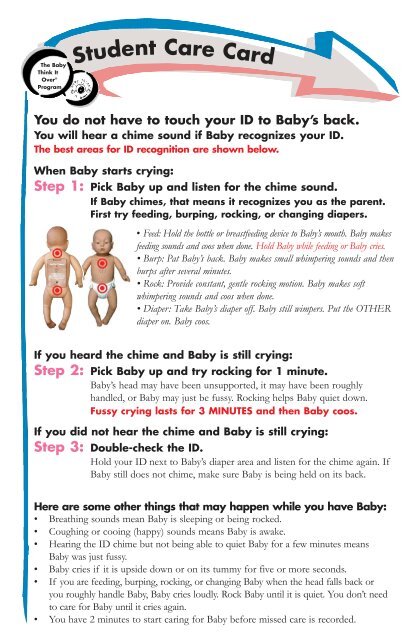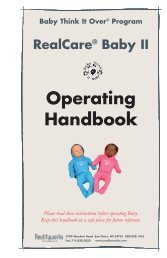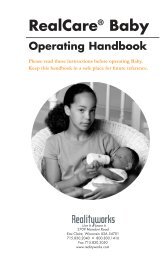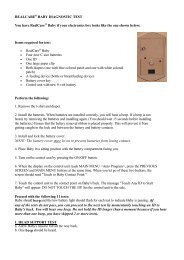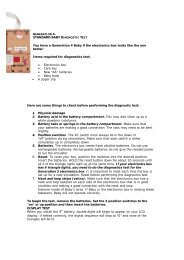Student Care Card Stu - Virtual Parenting
Student Care Card Stu - Virtual Parenting
Student Care Card Stu - Virtual Parenting
Create successful ePaper yourself
Turn your PDF publications into a flip-book with our unique Google optimized e-Paper software.
The Baby<br />
Think It<br />
Over ®<br />
Program<br />
<strong><strong>Stu</strong>dent</strong><br />
<strong>Care</strong><br />
<strong>Card</strong><br />
You do not have to touch your ID to Baby’s back.<br />
You will hear a chime sound if Baby recognizes your ID.<br />
The best areas for ID recognition are shown below.<br />
When Baby starts crying:<br />
Step 1: Pick Baby up and listen for the chime sound.<br />
If Baby chimes, that means it recognizes you as the parent.<br />
First try feeding, burping, rocking, or changing diapers.<br />
• Feed: Hold the bottle or breastfeeding device to Baby’s mouth. Baby makes<br />
feeding sounds and coos when done. Hold Baby while feeding or Baby cries.<br />
• Burp: Pat Baby’s back. Baby makes small whimpering sounds and then<br />
burps after several minutes.<br />
• Rock: Provide constant, gentle rocking motion. Baby makes soft<br />
whimpering sounds and coos when done.<br />
• Diaper: Take Baby’s diaper off. Baby still wimpers. Put the OTHER<br />
diaper on. Baby coos.<br />
If you heard the chime and Baby is still crying:<br />
Step 2: Pick Baby up and try rocking for 1 minute.<br />
Baby’s head may have been unsupported, it may have been roughly<br />
handled, or Baby may just be fussy. Rocking helps Baby quiet down.<br />
Fussy crying lasts for 3 MINUTES and then Baby coos.<br />
If you did not hear the chime and Baby is still crying:<br />
Step 3: Double-check the ID.<br />
Hold your ID next to Baby’s diaper area and listen for the chime again. If<br />
Baby still does not chime, make sure Baby is being held on its back.<br />
Here are some other things that may happen while you have Baby:<br />
• Breathing sounds mean Baby is sleeping or being rocked.<br />
• Coughing or cooing (happy) sounds means Baby is awake.<br />
• Hearing the ID chime but not being able to quiet Baby for a few minutes means<br />
Baby was just fussy.<br />
• Baby cries if it is upside down or on its tummy for five or more seconds.<br />
• If you are feeding, burping, rocking, or changing Baby when the head falls back or<br />
you roughly handle Baby, Baby cries loudly. Rock Baby until it is quiet. You don’t need<br />
to care for Baby until it cries again.<br />
• You have 2 minutes to start caring for Baby before missed care is recorded.
Frustration-reducing measures for when Baby is crying<br />
• Take several deep breaths and count to ten.<br />
• Say the alphabet.<br />
• Put Baby in a safe place, then leave the room for a few minutes.<br />
• Close your eyes and think of something pleasant.<br />
• Ask someone else to help.<br />
Safe holding methods<br />
At your shoulder The cradle hold The football hold Using a carrier<br />
IMPORTANT SAFETY REMINDERS!<br />
• Baby may cry while you are driving. Please be aware that the crying may start<br />
unexpectedly, and you should be prepared.<br />
• Never leave Baby unattended in a public place given the potential for misunderstanding.<br />
• Bring your vehicle to a complete stop in a safe location before caring for Baby, or to<br />
retrieve a piece of Baby’s equipment that falls.<br />
• Do not feed, burp, rock, change diapers, or otherwise care for Baby while driving.<br />
• Failure to install Baby in a car seat in a motor vehicle could result in Baby or the seat<br />
becoming projectiles in the event of a sudden stop or accident.<br />
• Do not place Baby on or near a stove, especially while cooking.<br />
• Never take your wristband off. Not only will you be deducted points, but you may lose<br />
the ID or stumble around in the dark looking for it if Baby cries during the night.<br />
• Baby should sleep somewhere close to your sleeping quarters, but not in bed with you.<br />
Baby may fall out of the bed or you could roll over on it, causing damage to Baby and<br />
discomfort to you.<br />
• Loud crying near people with potentially serious physical conditions, such as those susceptible<br />
to heart attack or stroke, should be avoided.<br />
• Make a note in your diary where you had to delay care of Baby because your safety or that<br />
of others may have been compromised.<br />
• Do not place Baby in or near water.<br />
• Baby’s crying or other sounds may cause pets to become agitated or aggressive. Keep Baby<br />
out of the reach of pets or other animals.<br />
• Use an infant car seat or carrier to transport Baby rather than holding Baby at all times.<br />
• Baby weighs 6.5 to 7 pounds and could cause discomfort for individuals with back pain.<br />
• Do not operate any type of equipment or attempt tasks requiring the use of both hands<br />
while holding Baby.<br />
• Do not allow small children to play with Baby. Baby’s hands<br />
and feet could be a choking hazard.<br />
*D930*<br />
D930


